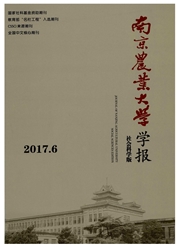

 中文摘要:
中文摘要:
在森的"可行能力"框架下构建农民福利的评价指标体系,运用模糊评价方法评价江苏省高淳县和盱眙县农民集中居住后的福利变化。结果发现:(1)集中居住改善了农户的居住条件和居住环境,但并没有显著改善农户的家庭经济状况、社会保障状况、社会资本状况和参与决策自由等功能;(2)经济发展水平较低的盱眙地区的农民集中居住后的福利改善水平显著高于经济发展水平较高的高淳地区。政策含义为优先实施经济不发达地区的农民集中居住项目和合理选择集中居住模式有利于保障农民福利和节约土地。
 英文摘要:
英文摘要:
The paper attempted to establish an index system for evaluating changes in farmers′ welfare in the post-concentrated residence age with the application of Sen′s Capability Approach,and then employed the fuzzy assessment approach to examine the changes in farmers′ welfare state in the wake of the concentrated residence in Gaochun County and Xuyi County of Jiangsu Province.The results indicated that:(1) the Project of Concentrated Residence only improved farmers′ accommodation and housing environment,but failed to improve their household economic status,social security,social capital and farmers′ liberty in decision-making;(2) the farmers′ welfare in such underdeveloped areas as Xuyi County improved much more than that in such developed areas as Gaochun County.The policy implications of the survey were that giving priority to the Project of Concentrated Residence in underdeveloped areas and selecting optimal concentrated residence models can facilitate farmers′ welfare protection and land conservation.
 同期刊论文项目
同期刊论文项目
 同项目期刊论文
同项目期刊论文
 Land tenure reforms and land conservation investments in China–what does real option value theory te
Land tenure reforms and land conservation investments in China–what does real option value theory te Integrated assessment of agricultural land use policies on nutrient pollution and sustainable develo
Integrated assessment of agricultural land use policies on nutrient pollution and sustainable develo 期刊信息
期刊信息
